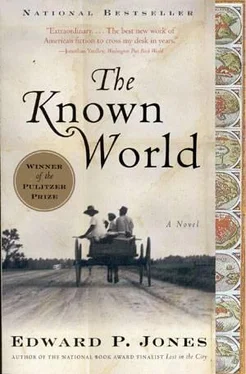6 A Frozen Cow and a Frozen Dog. A Cabin in the Sky. The Taste of Freedom.
On Sunday, the second day Henry Townsend had been in the ground, Maude Newman, his mother-in-law, came into her daughter’s bedroom at the house Henry and Moses had built and sat on the side of Caldonia’s bed, took her daughter’s hand in one of hers, sighing all the while. “My poor widow child,” Maude sighed. Only moments before, Loretta, Caldonia’s maid, had asked her mistress if she wanted her to bring up something for Caldonia to eat or drink. Caldonia told Loretta that her mind was not on food or drink; it was all she could do, she said to the woman who had been with her most of her married life, to open her eyes and to breathe. Loretta said, “Yes, ma’am,” knowing how true that must have been, and stepped back to watch Caldonia take her time to raise herself up in bed. Loretta had known of one woman’s slave who was required to do virtually everything for her mistress, even to wipe the mistress’s hind parts after every bowel movement. Caldonia had always been strong, choosing to do so much on her own, and Loretta had, over time, become more of a companion. “For all thas in her, she coulda been a slave,” Loretta had funned once to Celeste, Elias’s wife, knowing Celeste could keep secrets.
Once Caldonia was up in the bed and leaning back on the pillows, she stared at Loretta as if to ask what next did the world expect of her. Caldonia looked over at the open chiffarobe, whose door was broken and so would never close properly, looked at the black dress hanging there. It seemed to have its own life, so much life that it could have come down and walked over and placed itself over her body. Fastened itself. Her mother had worn the dress for only a month after Caldonia’s father had died. “I cannot do any more time with this dress,” Maude had said when she put it away. “Wearing black makes my skin itch. Mr. Newman was a man after God’s own heart but why should I suffer now that he is sitting with our Lord?” And Maude’s mourning had come to an end.
“My poor widow child,” Maude said again.
“Mama, please. Please don’t give me this today. Tomorrow. The day after tomorrow, but not today.”
“The legacy is your future, Caldonia, and that can’t wait. I wish it could, but no. All else can, but not the legacy.” For Maude, the legacy meant slaves and land, the foundation of wealth. Her fear was that Caldonia, in her grief, would consider selling the slaves, along with the land, as if to accomplish some wish Henry, tied to the want and need of a material world, had been too afraid to try to fulfill in life. “I don’t want you to be like your father, mired in so much grief he didn’t know right from wrong.”
“I learned from Henry not to let something like grief turn me from right to wrong, Mama.” With those words she could see him, in her mother’s garden saturated with the smell of honeysuckle, still wearing clothes too heavy for the season, talking about how he would be a master different from any other, the kind of shepherd master God had intended. He had been vague, talking of good food for his slaves, no whippings, short and happy days in the fields. A master looking down on them all like God on his throne looked down on him. He was a young shoemaker, a bootmaker, who more than a year before had completed the generous deal for Moses with William Robbins. But the words did not matter to Caldonia; she was young, unhappy with the courtship prospects all about her, and so even had he talked all afternoon of planting and harvesting tobacco, it would have been a serenade. This was more than a year after Augustus had broken his shoulder with the walking stick of an acorn and squirrels.
Caldonia considered her mother. Henry had been a good master, his widow decided, as good as they come. Yes, he sometimes had to ration the food he gave them. But that was not his fault-had God sent down more food, Henry would certainly have given it to them. Henry was only the middleman in that particular transaction. Yes, he had to have some slaves beaten, but those were the ones who would not do what was right and proper. Spare the rod…, the Bible warned. Her husband had done the best he could, and on Judgment Day his slaves would stand before God and testify to that fact.
“Henry taught me well,” Caldonia said to her mother.
Caldonia lay back down in the bed and closed her eyes. What would his slaves have said that very day about the kind of master Henry had been? Would they be as generous as they would be on Judgment Day when it was all over and they could afford to be generous? She opened her eyes and Maude was smiling at her. In Fern Elston’s class one day when Caldonia was ten, Calvin, her brother, had punched another child on the arm and the boy cried. “I didn’t hit him all that hard, Mrs. Elston. I hit him with a soft lick, a baby lick. I didn’t hurt him.” Fern had come up to Calvin and slapped him and shook him by the shoulders until Calvin cried. “Why are you crying, Calvin? I just gave you a baby lick.” When both boys had stopped crying, Fern said gently to Calvin, “The hitter can never be the judge. Only the receiver of the blow can tell you how hard it was, whether it would kill a man or make a baby just yawn.”
“I have no doubt that Henry taught you all you need to know,” Maude said and squeezed Caldonia’s hand. “But like your father, you have too much melancholy in your blood for your own good.” The death of his youngest child some thirteen years before had led Tilmon Newman to believe God wanted him to free his slaves, which numbered twelve at the time of the child’s death. God, Tilmon told Maude, had failed to get his meaning across with the deaths of Tilmon’s parents and his brothers-all of them in captivity-so he had started in on Tilmon’s children to bring the lesson closer to home. “Ain’t none a yall safe from God,” Tilmon said, days after he buried his child, who had been four years old. “Not even you, Maude. He will come through every mountain to get at you.”
Loretta now stepped back until her back was touching a bedroom wall. Then she edged herself so that she was all but enveloped by the shadow in the corner. She had to be near if Caldonia wanted her, but it would not do to have Maude think she was taking in every single word of the whatfors and whynots of their lives and making some strange sense of what was overheard. Some white mistresses did not care what their servants heard; they felt the servants had no more ability to hear and judge than the cups and saucers. And some, like Caldonia, saw some servants as confidants. But others, like Maude, felt God had pitted the world against them and no one could be more against them than property that could hear and speak and think. They would never make the mistake of believing a slave was no more than a cup or saucer. It seemed to Loretta that Maude rose each and every morning with the heat under her blood and a sword in both hands, and even her own children had to make known their loyalty to her all over again. Mistresses like that could be far more brutal on a slave, whether she owned the slave or not, and would do everything to separate a nosy slave from what little life she was used to. Years of serving with Caldonia might not mean anything to Maude. In a few moments, as the conversation continued, Loretta made her way unnoticed out into the hall.
“Mama, give me a little peace. My husband is not even cold. Just a little peace before you close me in with this. Moses is taking care of so much. And Calvin is here. I can mourn for just a bit more. Calvin is here.”
“Calvin, Calvin,” Maude said. “His blood has even more melancholy than yours. Leave it to him and your legacy will be out the door before morning.” Caldonia slid down even more in the bed, withdrawing her hand from her mother’s. “Don’t be some little girl, Caldonia.”
Читать дальше












